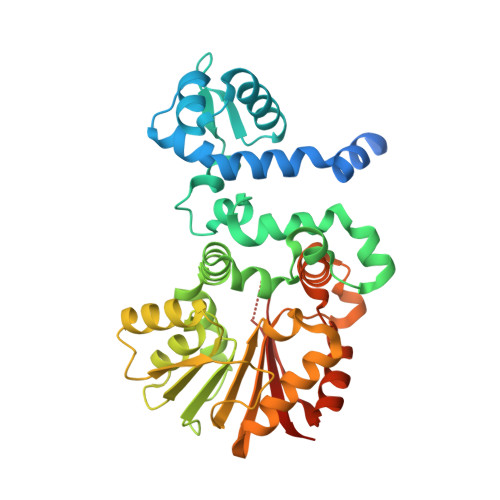Functional AdoMet Isosteres Resistant to Classical AdoMet Degradation Pathways.
Huber, T.D., Wang, F., Singh, S., Johnson, B.R., Zhang, J., Sunkara, M., Van Lanen, S.G., Morris, A.J., Phillips, G.N., Thorson, J.S.(2016) ACS Chem Biol 11: 2484-2491
- PubMed: 27351335
- DOI: https://doi.org/10.1021/acschembio.6b00348
- Primary Citation of Related Structures:
5EEG, 5EEH - PubMed Abstract:
S-adenosyl-l-methionine (AdoMet) is an essential enzyme cosubstrate in fundamental biology with an expanding range of biocatalytic and therapeutic applications. We report the design, synthesis, and evaluation of stable, functional AdoMet isosteres that are resistant to the primary contributors to AdoMet degradation (depurination, intramolecular cyclization, and sulfonium epimerization). Corresponding biochemical and structural studies demonstrate the AdoMet surrogates to serve as competent enzyme cosubstrates and to bind a prototypical class I model methyltransferase (DnrK) in a manner nearly identical to AdoMet. Given this conservation in function and molecular recognition, the isosteres presented are anticipated to serve as useful surrogates in other AdoMet-dependent processes and may also be resistant to, and/or potentially even inhibit, other therapeutically relevant AdoMet-dependent metabolic transformations (such as the validated drug target AdoMet decarboxylase). This work also highlights the ability of the prototypical class I model methyltransferase DnrK to accept non-native surrogate acceptors as an enabling feature of a new high-throughput methyltransferase assay.
Organizational Affiliation:
Department of Pharmaceutical Sciences, College of Pharmacy, University of Kentucky , 789 South Limestone Street, Lexington, Kentucky 40536-0596, United States.















